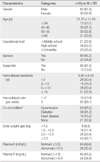Abstract
Purpose
This study was done to examine the relation of uncertainty, uncertainty appraisal, and self-management in patients undergoing hemodialysis, and to identify factors influencing self-management.
Methods
A convenience sample of 92 patients receiving hemodialysis was selected. Data were collected using a structured questionnaire and medical records. The collected data were analyzed using descriptive statistics, t-test, ANOVA, Pearson correlations and multiple regression analysis with the SPSS/WIN 20.0 program.
Results
The participants showed a moderate level of uncertainty with the highest score being for ambiguity among the four uncertainty subdomains. Scores for uncertainty danger or opportunity appraisals were under the mid points. The participants were found to perform a high level of self-management such as diet control, management of arteriovenous fistula, exercise, medication, physical management, measurements of body weight and blood pressure, and social activity. The self-management of participants undergoing hemodialysis showed a significant relationship with uncertainty and uncertainty appraisal. The significant factors influencing self-management were uncertainty, uncertainty opportunity appraisal, hemodialysis duration, and having a spouse. These variables explained 32.8% of the variance in self-management.
Figures and Tables
References
1. Smeltzer SC, Bare BG, Hinkle JL, Cheever KH.
IS Kang
JH Kang
JY Kang
KN Kwon
BE Kwon
KM Kim
. Brunner and Suddarth's textbook of medical surgical nursing. 12th ed. Philadelphia, PA: Lippincott Williams & Wilkins;2009.
2. The National Kidney Foundation. KDOQI clinical practice guidelines for chronic kidney disease: Evaluation, classification, and stratification. New York, NY: Author;2002. cited 2014 October 16. Available from: http://www2.kidney.org/professionals/KDOQI/guidelines_ckd/p4_class_g1.htm.
3. ESRD Registry Committee. Korean Society of Nephrology. Current renal replacement therapy in Korea: Insan memorial dialysis registry, 2013 [Internet]. Seoul: The Korean Society of Nephrology;2013. cited 2014 October 16. Available from: http://www.ksn.or.kr/journal/2014/index.html.
4. Chiou CP, Chung YC. Effectiveness of multimedia interactive patient education on knowledge, uncertainty and decision-making in patients with end-stage renal disease. J Clin Nurs. 2012; 21(9-10):1223–1231. DOI: 10.1111/j.1365-2702.2011.03793.x.
5. Kaba E, Bellou P, Iordanou P, Andrea S, Kyritsi E, Gerogianni G, et al. Problems experienced by haemodialysis patients in Greece. Br J Nurs. 2007; 16(14):868–872.
6. Hutchinson TA. Transitions in the lives of patients with end stage renal disease: A cause of suffering and an opportunity for healing. Palliat Med. 2005; 19(4):270–277.
7. Mishel MH. Uncertainty in illness. Image J Nurs Sch. 1988; 20(4):225–232.
8. Mishel MH. Reconceptualization of the uncertainty in illness theory. Image J Nurs Sch. 1990; 22(4):256–262.
9. Kim YJ, Choi H. The influence of uncertainty and social support on general well-being among hemodialysis patients. Korean J Rehabil Nurs. 2012; 15(1):20–29.
10. Yun SJ, Lee YH. Factors influencing uncertainty in dialysis patient by duration of dialysis. Korean J Adult Nurs. 2012; 24(6):597–606.
11. Lee MJ. Uncertainty, appraisal of uncertainty and health-related quality of life in recovering clients discharged from hospital after CABG. Ewha J Nurs Sci. 2009; 21(1):49–63.
12. Koo JY. Uncertainty and quality of life in ostomates with colorectal cancer patient [master's thesis]. Seoul: Yonsei University;2008.
13. Cha KS, Kim KH. Impact of uncertainty on resilience in cancer patients. Asian Oncol Nurs. 2012; 12(2):139–146.
14. Lee JH. The effect of self-efficacy promotion program on hemodialysis patients' self-efficacy, self-care practice and physiologic index [master's thesis]. Jinju: Gyeongsang National University;2003.
15. Song MR, Kim MJ, Lee ME, Lee IB, Shu MR. A study on the correlation between self-efficacy and self-care in hemodialysis patients. J Korean Acad Nurs. 1999; 29(3):563–575.
16. Curtin RB, Mapes DL. Health care management strategies of long-term dialysis survivors. Nephrol Nurs J. 2001; 28(4):385–394.
17. Kim AY, Kim SJ. The effect of education program on early hemodialysis patients' knowledge, self-care practice and physiologic index. Chonnam J Nurs Sci. 2008; 13(1):95–109.
18. Stiegelis HE, Hagedoorn M, Sanderman R, Bennenbroek FT, Buunk BP, van den Bergh AC, et al. The impact of an informational self-management intervention on the association between control and illness uncertainty before and psychological distress after radiotherapy. Psychooncology. 2004; 13(4):248–259. DOI: 10.1002/pon.738.
19. Bailey DE, Jr , Wallace M, Mishel MH. Watching, waiting and uncertainty in prostate cancer. J Clin Nurs. 2007; 16(4):734–741. DOI: 10.1111/j.1365-2702.2005.01545.x.
20. Joe YJ, Shin YH. Depression, self care compliance and physiological indices of hemodialysis patients. Keimyung J Nurs Sci. 2011; 15(1):115–122.
21. Mishel MH. The measurement of uncertainty in illness. Nurs Res. 1981; 30(5):258–263.
22. Chung C, Kim MJ, Rhee MH, Do HG. Functional status and psychosocial adjustment in gynecologic cancer patients receiving chemotherapy. Korean J Women Health Nurs. 2005; 11(1):58–66.
23. Mishel MH, Sorenson DS. Uncertainty in gynecological cancer: A test of the mediating functions of mastery and coping. Nurs Res. 1991; 40(3):167–171.
24. Kang Y. The relationships among uncertainty, appraisal of uncertainty, depression, anxiety and perceived health status in patients with atrial fibrillation. J Korean Acad Adult Nurs. 2005; 17(2):230–238.
25. Park MK, Kim IS. The comparative perceived family support, self-efficacy and quality of life between hemodialysis and peritoneal dialysis patients. Med J Chosun University. 2006; 31(3):54–63.
26. Jang YH, Oh HS, Jang GS. Self-care behaviors and physiological index according to cognitive function of hemodialysis patients. Korean J Health Serv Manag. 2012; 6(2):57–69.
27. Na DM, Lee KO, Seo CS. The relationship between family support and self-care performance of hemodialysis patients. Med J Chosun University. 2002; 27(2):231–239.
28. Kim HR. Relationship between uncertainty, sick role behaviors, and quality of life of rehospitalized patients underwent percutaneous coronary intervention. J Korean Clin Nurs Res. 2014; 20(3):279–289.
29. Lee JE, Kim SS, Kim SA, Han KH, Kim SH, Ji EJ, et al. Factors influencing health behavior of patients with chronic hepatitis B. Korean J Adult Nurs. 2011; 23(1):20–30.
30. Lee JM. A study on the subjectivity of cancer patients who have chemotherapy about uncertainty [master's thesis]. Seoul: Korea University;2014.




 PDF
PDF ePub
ePub Citation
Citation Print
Print







 XML Download
XML Download